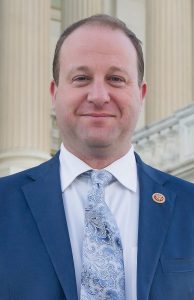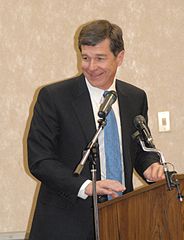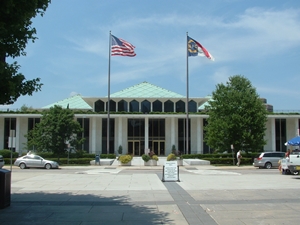May 6, 2019 •
Colorado General Assembly Adjourns Sine Die

Colorado Capitol Building
The 72nd Colorado General Assembly adjourned sine die on May 3 after 120 legislative days. During the session, House Bill 1007 passed creating contribution limits under the Fair Campaign Practices Act for county office candidates. Additionally, Senate Bill 68 passed […]
The 72nd Colorado General Assembly adjourned sine die on May 3 after 120 legislative days.
During the session, House Bill 1007 passed creating contribution limits under the Fair Campaign Practices Act for county office candidates.
Additionally, Senate Bill 68 passed expanding disclosure of electioneering communications.
The last day for the governor to act on bills for the 2019 session is June 2, 2019.
The General Assembly is scheduled to reconvene on January 8, 2020.
April 4, 2019 •
Colorado Governor Signs Electioneering Communications Bill
Gov. Jared Polis signed Senate Bill 68 on April 1, expanding disclosure of electioneering communications. For purposes of campaign finance disclosure, the bill expands the definition of electioneering communication in the Fair Campaign Practices Act to include any communication that […]
 Gov. Jared Polis signed Senate Bill 68 on April 1, expanding disclosure of electioneering communications.
Gov. Jared Polis signed Senate Bill 68 on April 1, expanding disclosure of electioneering communications.
For purposes of campaign finance disclosure, the bill expands the definition of electioneering communication in the Fair Campaign Practices Act to include any communication that is broadcast, printed, mailed, delivered, or distributed between the primary election and the general election.
The bill also requires any person who expends $1,000 or more per calendar year on electioneering communications or regular biennial school electioneering communications to state in the communication the name of the person making the communication in accordance with existing statutory requirements for communication constituting an independent expenditure.
The bill will take effect on August 2, provided adjournment sine die of the General Assembly is on May 3.
If, however, a referendum petition is filed against the bill, the bill would not take effect unless approved in the November 2020 general election.
The North Carolina Supreme Court ruled that pending Gov. Roy Cooper’s legal challenge of Senate Bill 68, which combines state elections and ethics boards, the new merged board can remain vacant. The boards merged in June into the state Board […]
 The North Carolina Supreme Court ruled that pending Gov. Roy Cooper’s legal challenge of Senate Bill 68, which combines state elections and ethics boards, the new merged board can remain vacant.
The North Carolina Supreme Court ruled that pending Gov. Roy Cooper’s legal challenge of Senate Bill 68, which combines state elections and ethics boards, the new merged board can remain vacant.
The boards merged in June into the state Board of Elections and Ethics Enforcement after a three-judge panel ruled against the governor, but Cooper has yet to appoint any board members.
With local elections coming up in the fall, some county elections boards are finding themselves in tough positions awaiting appointments to fill seats left open due to resignations because the state board appoints county board members.
The case is scheduled for arguments at the Supreme Court on August 28.
June 2, 2017 •
North Carolina Judges Dismiss Legal Challenge Against Elections and Ethics Boards Merger
On June 1, a three-judge panel unanimously dismissed Gov. Roy Cooper’s legal challenge against Senate Bill 68. Senate Bill 68 combines state elections and ethics boards, and became law when the House and Senate voted to override Gov. Roy Cooper’s […]
 On June 1, a three-judge panel unanimously dismissed Gov. Roy Cooper’s legal challenge against Senate Bill 68.
On June 1, a three-judge panel unanimously dismissed Gov. Roy Cooper’s legal challenge against Senate Bill 68.
Senate Bill 68 combines state elections and ethics boards, and became law when the House and Senate voted to override Gov. Roy Cooper’s veto of the bill.
A spokesman for the Democratic governor said shortly after the ruling that Cooper plans to appeal the decision to the state Supreme Court.
On April 28, a three-judge panel issued an order in Gov. Roy Cooper’s legal challenge against Senate Bill 68 to put the law on hold until a further hearing on May 10. The new law to combine state elections and […]
 On April 28, a three-judge panel issued an order in Gov. Roy Cooper’s legal challenge against Senate Bill 68 to put the law on hold until a further hearing on May 10.
On April 28, a three-judge panel issued an order in Gov. Roy Cooper’s legal challenge against Senate Bill 68 to put the law on hold until a further hearing on May 10.
The new law to combine state elections and ethics boards became law when the House and Senate voted to override Gov. Roy Cooper’s veto of Senate Bill 68.
Senate Bill 68 was a renewed effort to revamp the boards after a three-judge panel ruled that the General Assembly overstepped its state constitutional authority when it adopted Senate Bill 4 in 2016 to establish a similar bipartisan board to oversee elections and ethics.
On April 25, lawmakers finalized efforts to combine state elections and ethics boards with both the House and Senate voting to override Gov. Roy Cooper’s veto of Senate Bill 68. The bill merges the elections and ethics boards into a […]
 On April 25, lawmakers finalized efforts to combine state elections and ethics boards with both the House and Senate voting to override Gov. Roy Cooper’s veto of Senate Bill 68.
On April 25, lawmakers finalized efforts to combine state elections and ethics boards with both the House and Senate voting to override Gov. Roy Cooper’s veto of Senate Bill 68.
The bill merges the elections and ethics boards into a single board split evenly between political parties.
The merger of the boards under Senate Bill 68 comes after a three-judge panel ruled that the General Assembly overstepped its state constitutional authority when it adopted Senate Bill 4 to establish a similar bipartisan board to oversee elections and consider ethics complaints and issues.
Lawmakers are back to work attempting to combine state elections and ethics boards after a three-judge panel ruled that the General Assembly overstepped its state constitutional authority when it adopted Senate Bill 4 establishing a bipartisan board to oversee elections […]
 Lawmakers are back to work attempting to combine state elections and ethics boards after a three-judge panel ruled that the General Assembly overstepped its state constitutional authority when it adopted Senate Bill 4 establishing a bipartisan board to oversee elections and consider ethics complaints and issues.
Lawmakers are back to work attempting to combine state elections and ethics boards after a three-judge panel ruled that the General Assembly overstepped its state constitutional authority when it adopted Senate Bill 4 establishing a bipartisan board to oversee elections and consider ethics complaints and issues.
The House Elections Committee approved changes to Senate Bill 68 to remove the bill’s original content relating to school attendance, replacing it with a reworked proposal to create a Bipartisan State Board of Elections and Ethics Enforcement.
Senate Bill 68 would merge the elections and ethics boards, but the governor would be able to appoint all members from nominations made by North Carolina’s Republican and Democratic parties. The board would be split evenly between the two parties.
Senate Bill 68 is set for a floor vote in the House on April 5.
State and Federal Communications, Inc. provides research and consulting services for government relations professionals on lobbying laws, procurement lobbying laws, political contribution laws in the United States and Canada. Learn more by visiting stateandfed.com.

